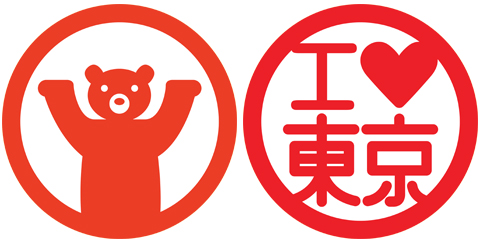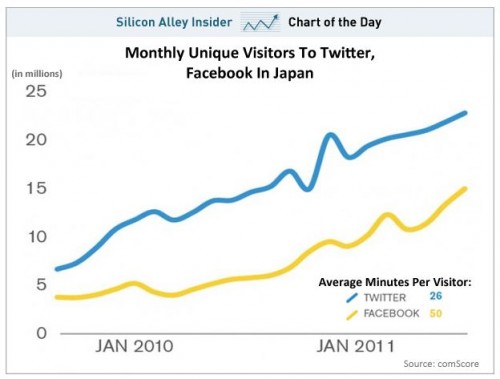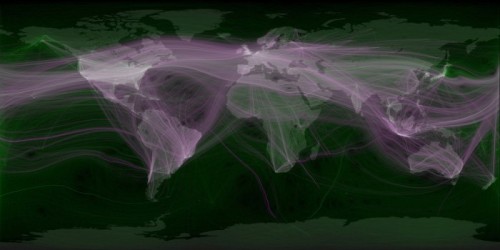We Are Social Asia Tuesday TuneUp #10
New Foursquare city badge for Tokyo
Foursquare has launched the Sakura badge for Tokyo users, which can be won by ‘checking-in’ at 5 of the 64 locations listed for this badge, including popular locations in the city such as Shibuya, Harajuku, and Shinjuku. Outside of Asia, Berlin also has a new Foursquare city badge.
The only country where Twitter is more popular than Facebook
According to ComScore and Business Insider, there is only one country in the entire world where Twitter triumphs over Facebook in terms of number of users, and it’s Japan. Japan sees roughly 25 million monthly unique visitors to Twitter, which far surpasses Facebook’s 15 million monthly unique visitors. However, this gap appears to be slowly converging, and the number of minutes spent on Facebook is nearly twice that of time spent on Twitter, so we may see the tables turn this year.
Asia’s chattiest Twitter nations
Eric Fischer’s data visualisation shows who is talking on Twitter, and also with whom they are speaking. To decipher the Twitter activity from the visualisation, “Green is physical movement from place to place; purple is @replies from someone in one location to someone in another; combining to white where there is both.” Within Asia, it appears that Indonesia is demonstrating the most intense activity with the concentration of purple and white, which is unsurprising, considering that Indonesia is the 3rd largest Twitter nation as of September last year. Japan also displays intense activity, even though we’re not quite sure what to make of the physical movement along the Eastern coast. Regardless, there is no doubt of active Twitter activity coming from Japan as evidenced by its 25 million monthly unique visitors.
Japan lags in world social media adoption, or does it?
According to ComScore, only 58% of Japanese Internet users use social media, a figure that pales in comparison to the other 41 out of 43 markets studied that have a social media penetration of 85% or higher. The only other outlier was China, which has a social media penetration rate of 53%. However, keeping in mind that mobile is not taken into account by ComScore data, we expect Japan’s social penetration rate to be higher given that a higher percentage of Japanese internet usage originates from mobile devices. Japan’s social networks and social gaming platforms such as Mobage, GREE and Mixi are also largely mobile, which are most likely unaccounted for in ComScore’s data. As pointed out by AdAge, an important factor to note also is the level of engagement that occurs on Japan’s social networks, instead of scrutinising social media penetration alone.
Can man live on Social Media alone?
The London Social Media Week team have teamed up with friends here in Singapore in an attempt to uncover whether man can live on social media alone. One lucky social media enthusiast will be flown to Singapore for 5 days equipped with nothing but a smart phone and the clothes they are wearing. They will then use the power of social media for food, accommodation, clothes and transport in the hope that the public’s goodwill will provide all. If you think this is a challenge you can handle, there is still time to apply, simply submit a 60 second video demonstrating what social media means to you and why before the 13th Jan…
RIM thanks Blackberry’s Asian fans with a video
Research in Motion (RIM) may be faltering against competition from iOS and Android, but in some parts of Asia, they are still number one. RIM holds 42% of Indonesia’s smartphone market, and allegedly have greatest market share in the smartphone industry of Thailand and Philippines as well. To thank its fans in Asia, RIM has posted a video to wish its users a Happy 2012.
Predictions for social media in India in 2012
Asia tech blog Penn Olson has featured 10 predictions for social media in India this 2012. They anticipate the socialisation of mobile, in which Indian users will spend more time on social networks via their mobile phones, which may prompt a focus on mobile apps instead of web apps that are accessed through a browser. Other predictions include a possible resurgence in forums, increased video consumption, greater focus on online reputation management by brands, and social media adoption by more small medium enterprises (SMEs).
The importance of brand response via social media
According to research from Conversocial, customer service from brands via social media is key. Over 80% of respondents said they would be at least a little put off from buying from a brand that they saw ignoring other customers.
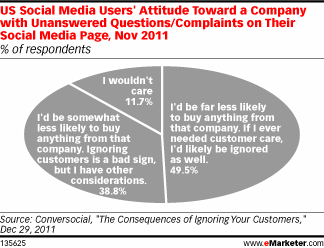
Social campaigns improve long term brand advocacy and purchase intent
BzzAgent have found that advocates’ likelihood to recommend a product is dramatically increased from 39% before to 61% directly after exposure to a social media marketing campaign. Even one year later, 55% of brand advocates are more likely to recommend a product.
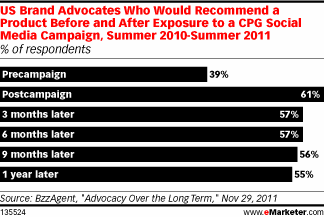
As for brand advocates’ own purchase intent, before a campaign 38% said they would purchase, however immediately after the campaign this dramatically increased to 69%, and remained this high for 3 months. Still yet more impressive, after one year, purchase intent was as high as 61%. This demonstrates that social media campaigns are effective at improving metrics which directly affect the bottom line.
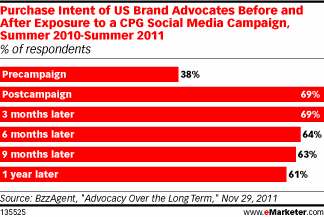
Marketers’ relationship with Wikipedia to change
It all began with an open letter to Jimmy Wales and Wikipedia, stating how PR professionals and Wikipedia have to work together to ensure Wikipedia is an accurate and available resource to the public, and another blog post from Stuart Bruce drawing the same conclusion – Wikipedia’s current guidelines need changing.
Fast forward two days and Wikipedia had agreed to work with the UK’s Chartered Institute of Public Relations to that end. Roger Bamkin, Chair of Wikipmedia UK, commented:
Recent incidents […] show that in some parts of the PR profession, a lack of understanding on how to engage with the Wikipedia community persists. We will work with the CIPR to ensure that their members, and through them the wider PR Profession, have access to the clearest possible guidance on the best way to work with Wikipedia.
It will be interesting to see how the CIPR and Wikipedia work this one out…
Google applies penalty against themselves
Google recently violated its own guidelines against paid links, when unbeknown to them, Unruly Media conducted a sponsored post campaign on their behalf to promote their Chrome browser, and one of the campaign’s participants failed to use the ‘no-follow’ attribute when linking to the Chrome homepage. After an investigation, Google then applied a penalty against themselves so that searches for “browser” now no longer bring up the Google Chrome homepage, with Chrome’s PageRank lowered for at least 60 days. Our very own Robin Grant commented:
I have a lot respect for Google for taking this action against themselves – although you could argue a two month ban is rather lenient compared to action they’ve taken against transgressors in the past. This incident goes to show the importance of the recently released joint IAB and ISBA guidelines on paid promotion in social media – had Google and Unruly followed these, they wouldn’t have come a cropper, and it does highlight the very real dangers of non-compliance.
Facebook’s flagged photos … offensive or just unattractive?
Facebook have determined, that last year, the majority of photos its users reported as offensive were not actually offensive, in fact they were just unattractive or unwanted. The difficulty lay in the fact that often these were photos that friends had posted, meaning the user couldn’t delete themselves, so they resorted to clicking flag instead. After Facebook noticed that the flagging tool was being used for these reasons, the company changed its photo reporting process, allowing users to message the person who posted the photo and complain with the following options:
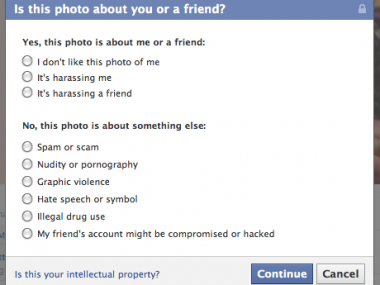
What vain creatures we are…
Moo creates social business cards with Facebook Timeline
UK startup Moo, is the only company to have integrated its social business cards with the Facebook platform. In an incredible promotion, they are giving away 10 million free business cards to the first 200,000 users who apply. The cards can feature different pictures on the front with a favourite quote or saying on the reverse which acts not only as promo for Moo but also for Facebook’s Timeline experience. The first batch of cards were taken-up in only 2 hours, and the cards are continuing to sell out like hot cakes, so if you want a free social business card, you better be quick.
Instagram allows you to share larger photos… and welcomes the President
Now when you choose to share your photos to Facebook through Instagram, the images will be instantly uploaded to an Instagram Photos Facebook album. These will appear in their full size in user’s newsfeeds and on the Timeline. Instagram also has a new VIP member, the one and only Barack Obama. Not only is he sharing photos through @barackobama, but he also urges supporters to share their photos from the campaign with the tag #obama2012. A clever way to give the public an insight into the daily life of the US President and to observe behind the scenes footage of the upcoming US Presidential Election.
Path is the new place to be
Path is where all the tech A-listers hang out these days, at least according to Seesmic’s Loic Le Meur. This new mobile-only social network, with a limit of 150 friends, has created a small, private, place where you can hang out online at any time of day with your close friends, and get notified about them constantly. Path has also recently added the option of sharing to Facebook, Twitter, Tumblr and Foursquare all at the same time. When people are tired of everything being public, Path just may be their point of call…
Anti-Drugs Timeline
Israel’s Anti-Drug Authority have cleverly used Facebook’s Timeline. The fictional character Adam Barak’s life is split in two, the Adam who pursued the path of drugs, and the Adam who stays clean. A neat way showing the possibilities of powerful messaging via the Timeline format, although brands will need to wait until Facebook rolls out the Timeline for Pages before executing similar campaigns.
Levi’s use Instagram to find their latest model
Levi Strauss have opened up the casting to their 2012 Brand Campaign via the world of Instagram. Anyone around the world can upload a photo of themselves with the tag #iamlevis in the hope they will be the next star of the fashion brand.
Puma recruits bloggers to document sailing race
Puma recently recruited 10 Instagram and Tumblr users to document the Volvo Ocean Race, where the brand has a sponsored boat competing in one of the world’s most gruelling sailing events. The bloggers will be also sharing their updates via Facebook and Twitter and have ‘free reign’ to cover what they wish. Puma clearly recognise the importance of bloggers as cultural influencers…
Olympics Games volunteers’ social media restrictions
The Olympics organisers have released social media rules for the 70,000 Games Maker volunteers during the 2012 Olympics. Volunteers are not allowed to mention their role, location, celebrities and athletes, including a ban on photos or posts featuring backstage VIPs. Progressive!
Man City’s Vincent Kompany takes to Twitter
Ahead of yesterday’s FA cup clash, Manchester City took to Twitter with their captain Vincent Kompany, urging fans to send him inspirational messages ahead of the game, with the hashtag #followthecaptain. The fan who tweets the most inspirational message won Kompany’s match day shirt, his armband and a signed poster of the tweet. After a number of footballers somewhat interesting relationships with Twitter, not mentioning any names…er…Joey Barton, let’s hope Vincent’s tweets keep him on the path of success.
Mothercare’s successful contextual app campaign
Mothercare has grown both the number of followers and the levels of engagement on its Facebook page, and on that of its sister brand Early Learning Centre, following a contextualised Advent Calendar competition. The prizes were determined by Mothercare using their Facebook page to listen for which would be in the greatest demand by parents. The app added an additional 32,473 fans across both brands without the support of Facebook advertising and the competition received 128,850 entries, proving the power of listening really does work…
Autoglass crowdsources star of ad
Autoglass, the car windscreen repair specialist, cast a Facebook competition winner as the star of their new advert. This is the first time a brand has crowdsourced the lead of their advert via Facebook. The winner Ian Graham had to compete against more than 137 other fans, and to enter all fans had to do was post a video or picture of themselves with their friends and family with their cars.
Shoe brand lets influential tweeters choose discounts
Miista, a relatively new shoe brand, launched ‘Cheaper with a Tweet’, where they reduce the price of their shoes for everyone whenever someone tweets about them. A greater discount is awarded if the person who tweets has a higher ranking on Klout. So if a kindly celeb were to tweet, the cost of a pair of shoes could be £0…
Grazia hosts Fashion Blogger Masterclass in Apple Store
UK Women’s magazine Grazia are hosting a series of video podcasts, workshops and masterclasses on fashion blogging with a collection of the A-listers in the fashion blogosphere at the Apple store in Covent Garden. The masterclasses are free and are being held every Thursday in January, so for all the fashionistas out there, you know where to go.
